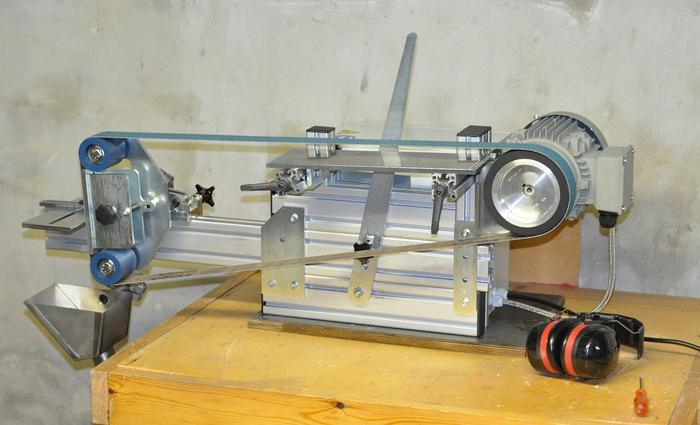Results 1 to 10 of 36
-
05-02-2013, 07:35 PM #1
 How do you thin down your blanks?
How do you thin down your blanks?
I have a stock of 1/8 wood, which is a bit too thick. What's the best and/or easiest way to reduce the thickness a bit? I'm looking at planers and combo belt/disc sanders on craigslist. Hand sanding rock hard exotic woods isn't cutting it.
One time, in band camp, I shaved with a Gold Dollar razor.
-
05-02-2013, 07:56 PM #2

I had to thin down some micarta and had the same dilemma

So what i did was pin them down to a wooden benchtop with light guage wire that fit the pin holes and file them down.
Worked like a charm
As always YMMV
Mike
-
05-03-2013, 02:55 AM #3Senior Member




- Join Date
- Nov 2012
- Location
- Across the street from Mickey Mouse in Calif.
- Posts
- 5,320
Thanked: 1185
A file might be kind of harsh against the grain. I haven't done it yet but belt would be my first try. Will be watching this one....or I might be at it in the next few days as I do have both disk and belt. I did shape some up with a Dremmel and that went well. Just have to keep moving so as not to dig a rut. I used a flap disk there.
Last edited by 10Pups; 05-03-2013 at 02:57 AM.
Good judgment comes from experience, and experience....well that comes from poor judgment.
-
05-03-2013, 02:59 AM #4

I find that when 1/8 material is taken and fully rounded, like on vintage scales, it comes out quite nicely. But just breaking the edges a bit, as seems to be more popular and is certainly less labor intensive, can leave the scales feeling a bit thick. Especially on smaller/lighter/full hollows.
I have seen it done and done very well with a file followed by hand sanding. But that was by a fellow who grew up working with wood (perhaps you remember BKratchmer). Personally, I do the rough rounding with a beltsander, and finish by hand.
I should say, though, that I find it very difficult to get an even thinning effect on a beltstander. Not sure how that is for others.
BKratchmer has a sweet thicknesser in the family shop, but that would be quite a tool for the application.
-
05-03-2013, 03:10 AM #5Just a guy with free time.

- Join Date
- Oct 2011
- Location
- Mid state Illinois
- Posts
- 1,448
Thanked: 247
I use a belt also. But there are some good threads that talk about this stuff with some more user friendly approaches. I have the same troubles as Holli4.
A link: http://straightrazorpalace.com/works...ng-planer.htmlLast edited by regularjoe; 05-03-2013 at 03:13 AM.
-
05-03-2013, 03:10 AM #6

I would double side tape down the scales to a flat surface, side by side and use coarse sanding paper with a flat sanding block. Sand the two at once to keep them even. There is not that much wood there, It is not that hard to change 1/8 to 3/32 with sand paper. If I lazy fat man like me can do it, it can not be that hard.
I agree with hollrpirating rounding the corners and edges and thinning the ends goes a long way.
Charlie
-
The Following User Says Thank You to spazola For This Useful Post:
cudarunner (05-07-2013)
-
05-03-2013, 04:08 AM #7'tis but a scratch!



- Join Date
- Oct 2010
- Location
- Durango, Colorado
- Posts
- 2,080
- Blog Entries
- 2
Thanked: 443
I rough-shape my wood scales with a jigsaw, then use double-sided tape to stick them together and trim them to final shape on a belt sander. I thin down the ends as well, and shape the whole length, just behind the belt-sander roller. Final shaping, of course, is by hand, but with fairly fine paper on the belt sander I can go pretty far toward final.
I leave the wedge end a little rough until I split the scales, sand the inner sides to their final smooth, then put the wedge in with a screw and nut. I final-sand the wedge and scales together, then take it all apart for finishing. I flatten both the wedge and the wedge ends of the scales on a DMT before the finish and assembly."These aren't the droids you're looking for." "These aren't the droids we're looking for." "He can go about his business." "You can go about your business."
-
05-03-2013, 04:36 AM #8

Best options:
1. Profile the scale with a file. A nice three-dimensional shape is really the best way to make a scale, anyhow.
2. Hand sand as Charlie suggested.
3. A #4 or #5 standard or high pitch bench plane.
If you're really lucky, you might have access to a wide-belt sander and then you can make a lot of thin stock very, very quickly... but my favorite is still #1.
-
05-03-2013, 04:37 AM #9

My word, it is BKratchmer himself!
-
05-03-2013, 08:39 AM #10

I use this.

Before, that, I used big bastard files with very coarse teeth.
The kind of thing a farrier would use for rasping down hooves.
Works like a charm.Til shade is gone, til water is gone, Into the shadow with teeth bared, screaming defiance with the last breath.
To spit in Sightblinder’s eye on the Last Day


 16Likes
16Likes LinkBack URL
LinkBack URL About LinkBacks
About LinkBacks






 Reply With Quote
Reply With Quote

